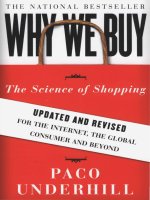- Trang chủ >>
- Khoa Học Tự Nhiên >>
- Vật lý
on desire why we want what we want nov 2005
Bạn đang xem bản rút gọn của tài liệu. Xem và tải ngay bản đầy đủ của tài liệu tại đây (2.4 MB, 337 trang )
On Desire:
Why We Want What
We Want
William B. Irvine
OXFORD UNIVERSITY PRESS
On Desire
This page intentionally left blank
On Desire
Why We Want What We Want
William B. Irvine
2006
Oxford University Press, Inc., publishes works that
further Oxford University’s objective of excellence
in research, scholarship, and education.
Oxford New York
Auckland Cape Town Dar es Salaam Hong Kong Karachi
Kuala Lumpur Madrid Melbourne Mexico City Nairobi
New Delhi Shanghai Taipei Toronto
With offices in
Argentina Austria Brazil Chile Czech Republic France Greece
Guatemala Hungary Italy Japan Poland Portugal Singapore
South Korea Switzerland Thailand Turkey Ukraine Vietnam
Copyright © 2006 by William B. Irvine
Published by Oxford University Press, Inc.
198 Madison Avenue, New York, NY 10016
www.oup.com
Oxford is a registered trademark of Oxford University Press
All rights reserved. No part of this publication may be reproduced,
stored in a retrieval system, or transmitted, in any form or by any means,
electronic, mechanical, photocopying, recording, or otherwise,
without the prior permission of Oxford University Press.
Library of Congress Cataloging-in-Publication Data
Irvine, William Braxton, 1952–
On desire : why we want what we want / William B. Irvine
p. cm. Includes bibliographical references and index.
ISBN-13: 978-0-19-518862-2
ISBN-10: 0-19-518862-4
1. Desire. I. Title.
BF575.D4178 2005
128'.3—dc22 2005005938
9 8 7 6 5 4 3 2 1
Printed in the United States of America
on acid-free paper
For Jamie
This page intentionally left blank
Contents
Acknowledgments ix
Introduction 1
PART ONE
THE SECRET LIFE OF DESIRE
ONE
The Ebb and Flow of Desire 11
TWO
Other People 31
PART TWO
THE SCIENCE OF DESIRE
THREE
Mapping Our Desires 55
FOUR
The Wellsprings of Desire 68
FIVE
The Psychology of Desire 91
SIX
The Evolution of Desire 120
SEVEN
The Biological Incentive System 145
PART THREE
DEALING WITH OUR DESIRES
EIGHT
The Human Condition 175
NINE
Religious Advice 182
TEN
Religious Advice Continued: Protestant Sects 211
ELEVEN
Philosophical Advice 238
TWELVE
The Eccentrics 258
THIRTEEN
Conclusions 279
Notes 298
Works Cited 309
Index 316
viii
Contents
Acknowledgments
If the hard drive of my computer can be trusted, I first got the
idea to write a book on desire—succumbed, one might say, to the
desire to write such a book—in September 2000. Between that
time and when the final words were being written in the closing
days of 2004, many people contributed to the book in a variety of
ways. I would like to take this opportunity to thank them.
First, thanks to the students who signed up for the desire
seminars I taught in the winter of 2001 and the winter of 2003;
to Derek Vanhoose and Jason Phillips, who did independent
study with me on desire; and especially to Nicholas Barnard,
Chris Poteet, and Sarah Kaplan, who read the manuscript out-
side of class. These students were the guinea pigs on whom I
tested my work in progress.
Thanks to my colleagues in Wright State University’s Col-
lege of Liberal Arts and Department of Philosophy for allow-
ing me to lecture them about desire. Thanks to my colleagues
Scott Baird and Don Cipollini in the Biology Department; Scott
discussed the evolution of desire with me, and Don arranged
for me to give a seminar on the topic. A special thanks to my
colleague James McDougal in the Department of Pharmacol-
ogy and Toxicology for reading and commenting on chapter
x
Acknowledgments
drafts. Thanks also to Bruce LaForse of the Classics Depart-
ment for answering questions about Greek and Latin, and to
Carlos Lopez of the Religion Department for answering ques-
tions about Hinduism and Buddhism.
Thanks to Gary Klein for letting me give a presentation on
the psychology of desire at Klein Associates, and thanks to Terry
Stanard and David Malek at Klein for their feedback on my re-
search. Gary also deserves a special thanks for his encourage-
ment and his assistance in helping move this project forward.
Thanks to Connie Steele and Karen Chamberlain, who took a
special interest in the desire project and offered encouragement.
Thanks also to Elda Rotor and Cybele Tom at Oxford for
their first-rate editorial direction and for reminding me that an
individual’s progress as an author is measured not only in how
many words are written each day but in how many of those
words are subsequently deleted.
Finally, I am grateful for permission to reprint an excerpt
from “Papyrus Chester Beatty I,” from
Love Lyrics of Ancient
Egypt,
translated by Barbara Hughes Fowler, copyright © 1994
by the University of North Carolina Press. Used by permission
of the publisher.
Acknowledgments
xi
Little is needed to make a wise man happy, but noth-
ing can content a fool. That is why nearly all men are
miserable.
—La Rochefoucauld
This page intentionally left blank
On Desire
This page intentionally left blank
Desire is a subject upon which . . . true views can only
be arrived at by an almost complete reversal of the
ordinary unreflecting opinion.
—Bertrand Russell
Introduction
You are currently experiencing desire; otherwise, you wouldn’t
be reading these words. Even if you are reading them at the
behest of someone else, you are motivated by your desire to
please that person. And if you stop reading, you will do so not
because you have stopped desiring but because your desires
have changed.
We are awash in desire at virtually every waking moment.
If we fall asleep, we temporarily subdue our desires—unless
we dream, in which case our dreams will likely be shaped by
our desires. Our skill at forming desires is truly remarkable.
No one has to teach us how to do it. It is, furthermore, a skill
we can exercise endlessly without tiring. When it comes to
desiring, we are all experts. If there were an Olympics of desir-
ing, we would all make the team. Sickness and old age may
change what we desire, but they do not stop us from desiring.
Try, for a moment, to stanch the flow of desire. You will
have to stop squirming, tapping your fingers, clenching your
toes; you will have to let your tongue go slack in your mouth
2
Introduction
and let your eyelids close; you will have to slouch in your chair—
or better still, lie down; to the extent possible, you will have to
relinquish control of your breathing; you will have to let your
mind go blank. You will, in other words, have to enter what we
call a meditative state. And even then you will not have purged
yourself of desire: you would not remain in this state unless
you had an ongoing desire to do so. It takes desire to attempt,
unsuccessfully, to extinguish desire.
If you try the above experiment, you will discover that it is
almost impossible to keep your mind empty. New thoughts
will arise, many of which express desire. You might notice that
you are hungry and wish to eat, or that you are uncomfortable
and wish to fidget. You might experience anger, which reflects
disappointment of your past desires, or anxiety, which reflects
your desires about the future. This experiment, by the way,
resembles the Zen meditation known as zazen. By performing
this meditation, Zen practitioners gain insight into the insidi-
ous process by which desires form within us.
Desire animates the world. It is present in the baby crying for
milk, the girl struggling to solve a math problem, the woman
running to meet her lover and later deciding to have children,
and the old woman, hunched over her walker, moving down
the hall of the nursing home at a glacial pace to pick up her
mail. Banish desire from the world, and you get a world of
frozen beings who have no reason to live and no reason to die.
Some people have far fewer desires than the rest of us. Some
of them lack desire because they are depressed; others lack it
because they have achieved enlightenment. This enlighten-
ment, by the way, is typically the end result of years of con-
Introduction
3
scious effort, brought on by an intense desire to free them-
selves, to the extent possible, from the grip of desire.
Because we continually experience desire, we are oblivious
to its presence in us. It is like the noise made by the fan of a
computer. The noise is always there, a low whisper, and be-
cause it is always there, we stop noticing it. Similarly, we are
usually oblivious to our desires—to their ebb and flow within
us, to the role they play in our lives. It is only when our desires
are intense (like when we fall in love) or when they come into
conflict (like when we want a bowl of ice cream but, because
we are on a diet, simultaneously want not to want it) that we
pay attention to our desires, with a mixture of puzzlement and
vexation. And because we are oblivious to the workings of
desire within us, we are full of misconceptions about it.
One consequence of reading this book may be that for the
first time in your life you pay close attention to the operation
of desire within you. When you do this, you will quickly be-
come aware of the remarkable extent to which your desires
have a life of their own. They pop into your head, seemingly
out of nowhere. Indeed, in many cases, you don’t so much
choose
your desires as
discover
them within you. You will also
come to appreciate the extent to which these unbidden desires
determine how you spend your days and, in the long run, how
you spend your life.
Another thing: once you gain an understanding of how de-
sire works, the desires you form are likely to change. This cer-
tainly happened to me over the course of my research. Once I
came to understand the extent to which desires arise within
me spontaneously and not as the result of rational thought
processes, I grew suspicious of my desires. “Where did this
desire come from?” I would ask. “Why do I want this thing
4
Introduction
that I want?” And having asked, I would in many cases end up
discarding the suspect desire. (In many cases, but not in all! I
certainly don’t claim to have mastered desire.)
My goal in investigating desire was to turn it inside out—to
understand how and why desires arise, how they affect our lives,
and what we can do to master them. In pursuing this goal, I
examined what Buddhists, Taoists, Hindus, the Amish, Shak-
ers, and Catholic saints have said about desire, as well as what
ancient Greek and Roman and modern European philosophers
have said. Besides being multicultural, my examination of de-
sire was multidisciplinary. After examining the writings of phi-
losophers and religious thinkers, I investigated scientific
research into how and why we form the desires we form.
Lots of people have thought and written about desire in the
last few millennia. The reader might therefore wonder what, if
anything, is left to say about the subject. As it turns out, this is an
auspicious time for a reexamination of desire. In the last three
decades, evolutionary psychologists have made a number of dis-
coveries concerning why we want what we want. During that
same period, neuroscientists have made discoveries that help us
understand, for the first time ever, the mechanism by which we
desire. This understanding allowed them to develop drugs such
as Prozac that rekindle desire in depressed patients.
In the following pages, I will attempt to reconcile classical
views on desire with the scientific research done in the last few
decades. As we shall see, this research substantially confirms
many of the prescientific observations of philosophers and
religious thinkers about the workings of desire. It also vali-
dates much of the advice on mastering desire offered by the
likes of Buddha, Epictetus, and Thoreau.
Introduction
5
The social and economic developments of recent decades
also make this an ideal time to reexamine desire. Around the
world, rising levels of affluence have not translated into in-
creased levels of personal satisfaction. In particular, the citi-
zens of affluent nations enjoy a level of material well-being
unimaginable to their great-grandparents. Even those citizens
labeled impoverished by government statisticians have antibi-
otics, reliable contraception, CD players, Internet access, and
indoor plumbing. But although they “have it all” compared to
their ancestors, they remain dissatisfied.
Most people spend their days pursuing worldly success—
fame, fortune, and all the things that go with them. (And if
not fame and fortune, at least social status and relative afflu-
ence.) They imagine that on gaining this success, they will
also gain satisfaction—they will at last feel satisfied with their
accomplishments, relationships, possessions, and most impor-
tantly, with their lives. And with this satisfaction, they think,
will come lasting happiness. What they fail to realize, as I shall
argue in the following pages, is that it is entirely possible to
gain satisfaction without pursuing, much less gaining worldly
success. Indeed, in pursuing worldly success, people generally
impair their chances of gaining personal satisfaction.
People commonly think that the best way to attain happi-
ness is to change their environment—their house, their clothes,
their car, their job, their spouse, their lover, their circle of
friends. But those who have thought carefully about desire—
the people whose views we will examine in the following
pages—have unanimously drawn the conclusion that
the best
way—indeed, perhaps the only way—to attain lasting happi-
ness is not to change the world around us or our place in it but
6
Introduction
to change ourselves
. In particular, if we can convince ourselves
to want what we already have, we can dramatically enhance
our happiness without any change in our circumstances. It sim-
ply does not occur to the typical person that satisfaction can
best be gained not by working to satisfy the desires we find
within us but by selectively suppressing or eradicating our de-
sires. As we shall see, throughout the ages and across cultures,
thoughtful people have argued that the best way to attain hap-
piness is to master our desires, but throughout the ages and
across cultures, ordinary people have ignored this advice.
Perfect mastery of our desires is probably impossible. Even
Buddha did not succeed in extinguishing desire: after his en-
lightenment, he retained a number of desires—to breathe, to
eat, and most notably, to share with others the source of his
enlightenment. What we should therefore seek is relative mas-
tery: we should learn to sort through our desires, working to
fulfill some of them, while working to suppress others.
How will we know when we have “mastered” desire? We
will experience what, as we shall see, has been the goal of most
of those who have thought carefully about desire—a feeling
of tranquility. This should not be confused with the kind of
tranquility brought on by ingestion of a tranquilizer. It is in-
stead marked by a sense that we are lucky to be living what-
ever life we happen to be living—that despite our circumstances,
no key ingredient of happiness is missing. With this sense comes
a diminished level of anxiety: we no longer need to obsess over
the things—a new car, a bigger house, a firmer abdomen—
that we mistakenly believe will bring lasting happiness if only
we can obtain them. Most importantly, if we master desire, to
the extent possible to do so, we will no longer despise the life
we are forced to live and will no longer daydream about living
Introduction
7
the life someone else is living; instead, we will embrace our
own life and live it to the fullest.
The remainder of this book is divided into three parts. In Part
One, I consider the secret life of desire. I begin by describing
cases in which people find themselves suddenly and unaccount-
ably in the grip of desire, as well as cases in which the desires
people took for granted—that for decades had shaped their
lives—suddenly abandon them. I also examine our intense need
to interact with and win the admiration of other people.
If we are to win our battle against undesirable desires, it
helps to understand them. It is for this reason that, in Part Two
of this book, I take a look at what scientists have discovered
about desire—about how we form desires and why we form
the desires we do. I begin with a discussion of the structure of
desire and the sources of desire within us. I go on to describe
some of the research, undertaken by neuroscientists and psy-
chologists, on what takes place in the brain when we desire.
Then I speculate on how we evolved the ability to desire and
on what specific desires came to be “hardwired” into us as the
result of our evolutionary past. Because of this wiring, we tend
to form certain desires, but it is by no means clear that by work-
ing to satisfy these desires we will have a life that is either happy
or meaningful.
In Part Three, I examine the advice on mastering desire that
has been given over the millennia and across cultures, includ-
ing religious, philosophical, and what can best be described as
eccentric advice.
Readers should be warned at the outset that I will not, in
the following pages, provide a “magic bullet” with which they
can instantly and effortlessly eradicate unwanted desires. What
8
Introduction
I instead offer is insight into how desire works, the role it plays
in human life, and the connection between desire formation,
desire fulfillment, and human happiness. The hope is that read-
ers armed with this insight will achieve a greater level of per-
sonal satisfaction than if they were afflicted, as most people
are, with misconceptions about the workings of desire.
Readers might also benefit from my discussion of the ad-
vice thoughtful people have offered, over the millennia, on how
we can prevent undesirable desires from arising within us and
expel them from our minds when, despite our best efforts, they
do arise. Again, I have no magic bullet to offer: following any
of this advice will take time and effort. If we like what the Zen
Buddhists have to say about mastering desire, we might want
to spend hours in silent meditation; if we like what the Amish
say, we might want to join an Amish community (if they will
have us); if we like what the Stoic philosophers say, we might
want to spend time studying their writings. But having said
this, I should add that the time and effort we spend trying to
master desire are probably considerably less than the time and
effort we will expend if we instead capitulate to our desires
and spend our days, as so many people do, working incessantly
to fulfill whatever desires float into our head.
PART ONE
THE SECRET LIFE OF
DESIRE
This page intentionally left blank









